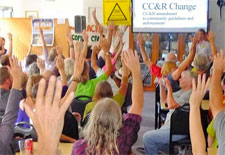 *Asked & Answered
*Asked & Answered
Asked – Our HOA has established several working committees such as Finance and Compliance. Do these committees have to conduct meetings open to the public? Neither one has power to spend money but merely makes recommendations to the Board of Directors.
Answered – No. The provisions of the “Open Meeting Act” (Civil Code §4900) requiring open meetings apply only to “board meetings.” A “board meeting” is defined as “a congregation, at the same time and place, of a sufficient number of directors to establish a quorum of the board, to hear, discuss, or deliberate upon any item of business that is within the authority of the board.” Civil Code §4090(a) (Emphasis added). Therefore, provided that the committee is not comprised of a sufficient number of directors so as to constitute a quorum (typically a majority) of the board, the committee’s meetings are not required to be open to the membership.
As illustrated in your question, most committees are purely advisory in nature and provide their findings/recommendations to the board in an open board meeting. Even where a committee does have some decision-making authority (i.e., to approve homeowner architectural applications or expenditures for an ongoing HOA construction project), an “item of business” contemplated by the Open Meeting Act does not include “actions that the board has validly delegated to…. [a] committee of the board comprising less than a quorum of the board.” Civil Code §4155 (Emphasis added). Therefore, if the board has delegated an action or decision to a committee comprised of less than a quorum of the board, the committee’s decision-making authority would not in itself trigger the Open Meeting Act’s requirements.
|
Even if your committee is not required to hold open meetings, it may be beneficial for committees with decision-making authority to provide notice to the membership and to post an agenda. Doing so will help prevent claims of impropriety on the part of the committee or the board in situations where a member may object to a decision or action by the committee. You should also refer to your HOA’s Bylaws to determine if there are any additional committee requirements. |
Blog post authored by Tinnelly Law Group attorney, Terri Morris.
To submit questions to the HOA attorneys at Tinnelly Law Group, click here.
 HOA Lawyer Blog
HOA Lawyer Blog


 Our
Our  *New Library Article
*New Library Article

 *New Legislation
*New Legislation

 Our
Our  *New Library Article
*New Library Article